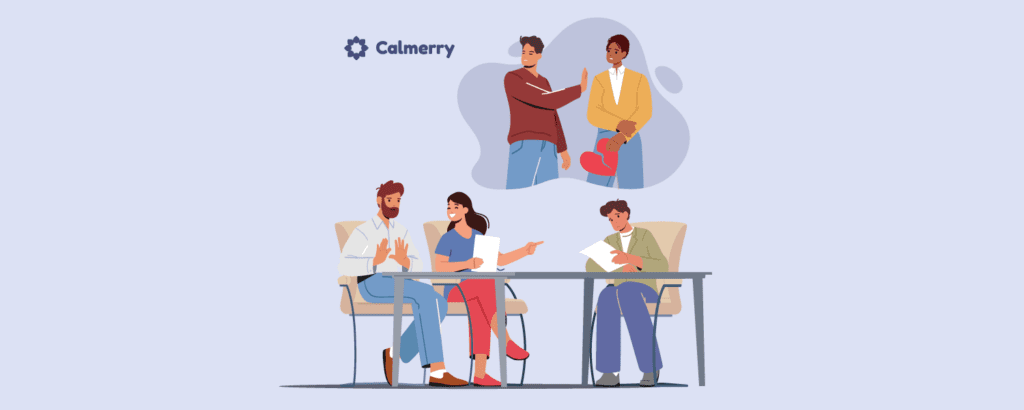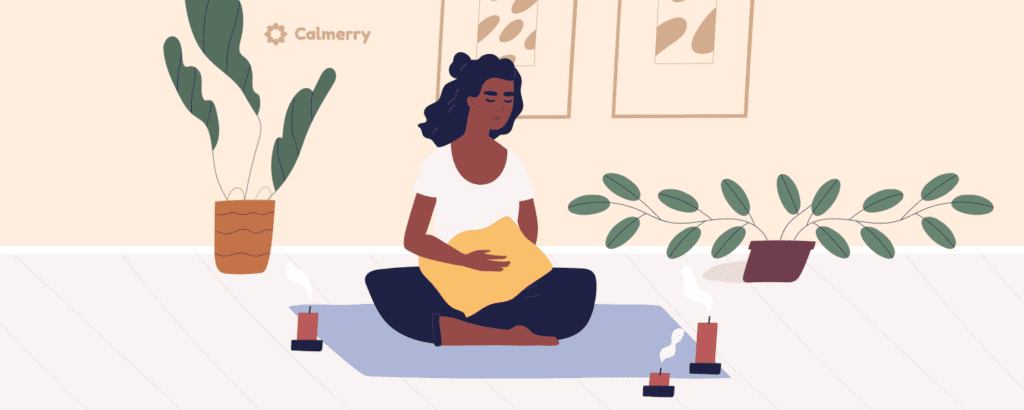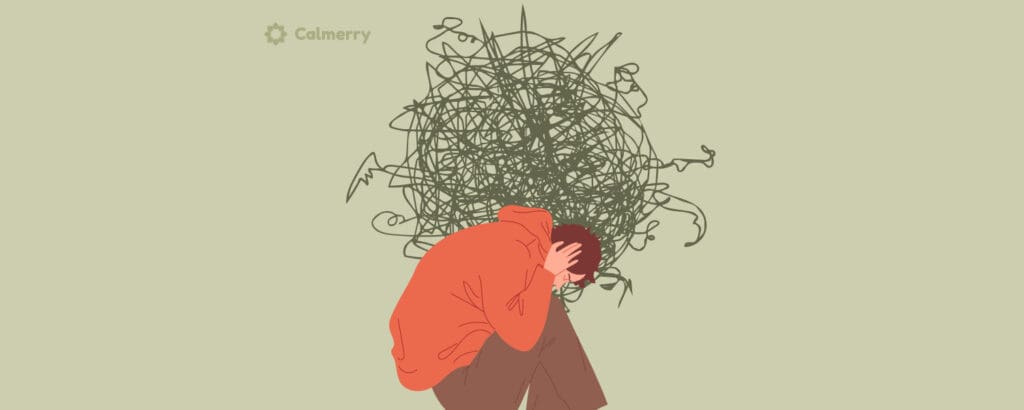7 (Positive) Psychological Effects of Watching Horror Movies
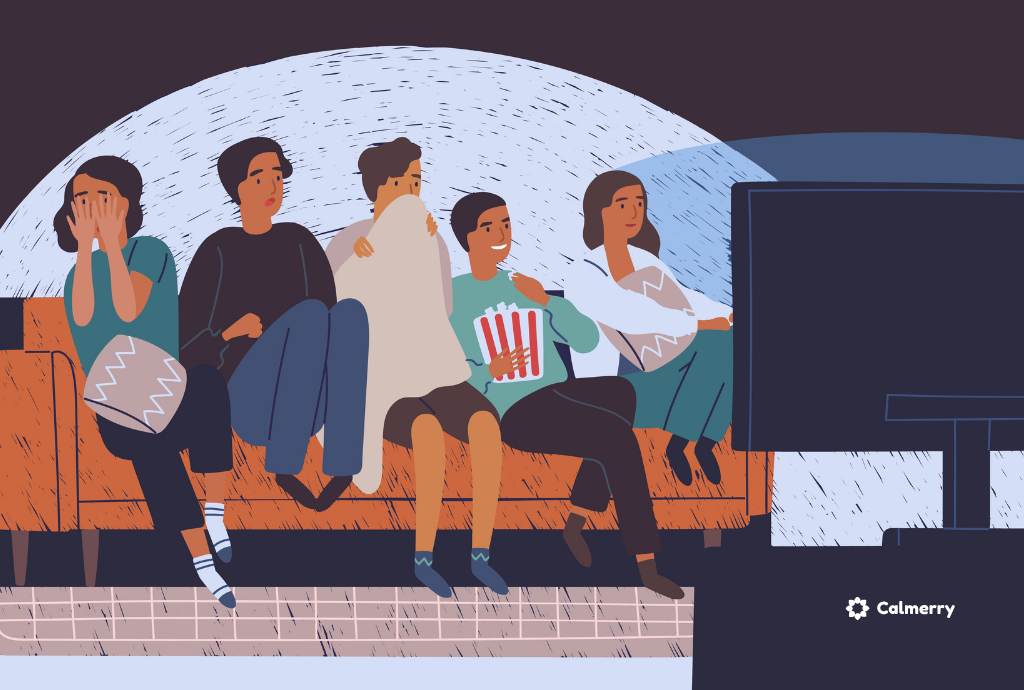
In this article
Spooky Day is upon us! 🎃 Spirits, witches, bloody skeletons, haunted houses, jack-o-lanterns, and trick-or-treating — Halloween is a night for a good fright and the macabre merriment everyone loves. It’s also the time for many to partake in the tradition of picking out and watching horror movies.
Horror is quite a controversial genre associated with negative emotions and feelings — and for a good reason. Films like The Shining, It, The Conjuring, Insidious, Get Out, A Quiet Place, and Ready or Not induce an atmosphere of overwhelming anxiety, fear, and panic.
Nevertheless, horror movies can actually benefit your mental health.
The idea of watching them in the name of mental well-being may seem counterintuitive. But whether you’re a true horror movie fan, or you prefer to watch them once a year on Halloween, covering your eyes in terror, or you avoid them altogether — which is fine in any case — there are some mental health benefits you can enjoy.
We’ve rounded up 7 unexpected positive psychological effects of horror movies.
1. Horror movies provide a safe outlet to explore our fears
Horror movies don’t create fear. They release it.
You don’t enter the theater and pay your money to be afraid. You enter the theater and pay your money to have the fears that are already in you.
Wes Craven, an American film director
So, horrors use fictional or real events/elements to help us face and understand our own fears through a controlled environment where we know everything is safe. [1] Hudson, M., Seppälä, K., Putkinen, V., Sun, L., Glerean, E., Karjalainen, T., Karlsson, H. K., Hirvonen, J., & Nummenmaa, L. (2020). Dissociable neural systems for unconditioned acute and sustained fear. NeuroImage, 216, 116522. https://doi.org/10.1016/j.neuroimage.2020.116522 We put them on screen and vicariously experience them through someone else. It’s somehow akin to the practice of exposure therapy.
For example, you may discover that you’re afraid of clowns after watching It.
Or, Anabelle helped you understand that dolls really cause you a sense of unease.
Or, you may have experienced excessive palm sweating watching the “Glass Bridge” game in Squid Game, feeling the danger of height while cuddling on your couch.
Or, there could have been a moment that elicited intense emotions, and you still don’t know why.
Horrors are a great way to face and feel your fears and explore your reactions without physically exposing yourself to real danger.

Besides, some people really enjoy unwinding with a good scare and go back for more. And as suggested in one research, there are many horror fans among people with anxiety. [2] Scrivner, C., Andersen, M. M., Schjoedt, U., & Clasen, M. (2023). The psychological benefits of scary play in three types of horror fans. Journal of Media Psychology, 35(2), 87–98. https://doi.org/10.1027/1864-1105/a000354
Morbid curiosity — an interest in learning about unpleasant, threatening, fearful situations — can be one of the reasons for this. [3] Scrivner, C., & Clasen, M. (2022). Why frightening imaginary worlds? Morbid curiosity and the learning potential of horror. Behavioral and Brain Sciences, 45. https://doi.org/10.1017/s0140525x21002259
Many people have an increased interest in gathering information about threats, although the process can be spine-chilling. While covering our eyes, we still peek through our fingers to watch over a sewer-lurking clown. The fight-or-flight response tells us that learning more about the threat first is wise.
This way, we can know how to identify and deal with it if it happens.
In other words, horrors can help us increase our emotional clarity — and become more aware of our emotions and their sources. Thus, we learn to build healthy relationships with our emotions, the outer world, and ourselves.

2. Horror movies help us gain coping skills and boost resilience
Facing your fears and being aware of your emotions are the first steps in learning how to navigate them.
A January 2021 study found that horror fans were more psychologically resilient and exhibited fewer symptoms of distress during the emotionally draining months of the pandemic.
Simulations can teach people how to navigate dangerous situations and manage their emotions. This is how the hypothesis that horrors can teach coping strategies got its grounding.
For example, you may have noticed some actions you perform during frightening movie moments:
- Covering your eyes
- Turning on the lights
- Pausing the movie
- Reading the plot beforehand
- Starting to talk with friends
- Turning down the sound
- Breathing deeply
- Screaming
These are examples of how you healthily regulate the intensity of your anxiety and stress in tense moments.
And you know that during a movie, you can freely express your fears without any consequences. According to the research, this may lead to less reliance on maladaptive mechanisms, such as emotional suppression or avoidance behavior, and improved emotional regulation skills in real life. [4] Scrivner, Coltan & Christensen, Kara. (2021). Scaring away anxiety: Therapeutic avenues for horror fiction to enhance treatment for anxiety symptoms. 10.31234/osf.io/7uh6f.
This is associated with psychological resilience. [5] Scrivner, C., Johnson, J. A., Kjeldgaard-Christiansen, J., & Clasen, M. (2021). Pandemic practice: Horror fans and morbidly curious individuals are more psychologically resilient during the COVID-19 pandemic. Personality and Individual Differences, 168, 110397. https://doi.org/10.1016/j.paid.2020.110397
Horror movies help us develop a toolkit for dealing with anxiety, stress, and intense feelings while we have fun from the comfort of our couches.
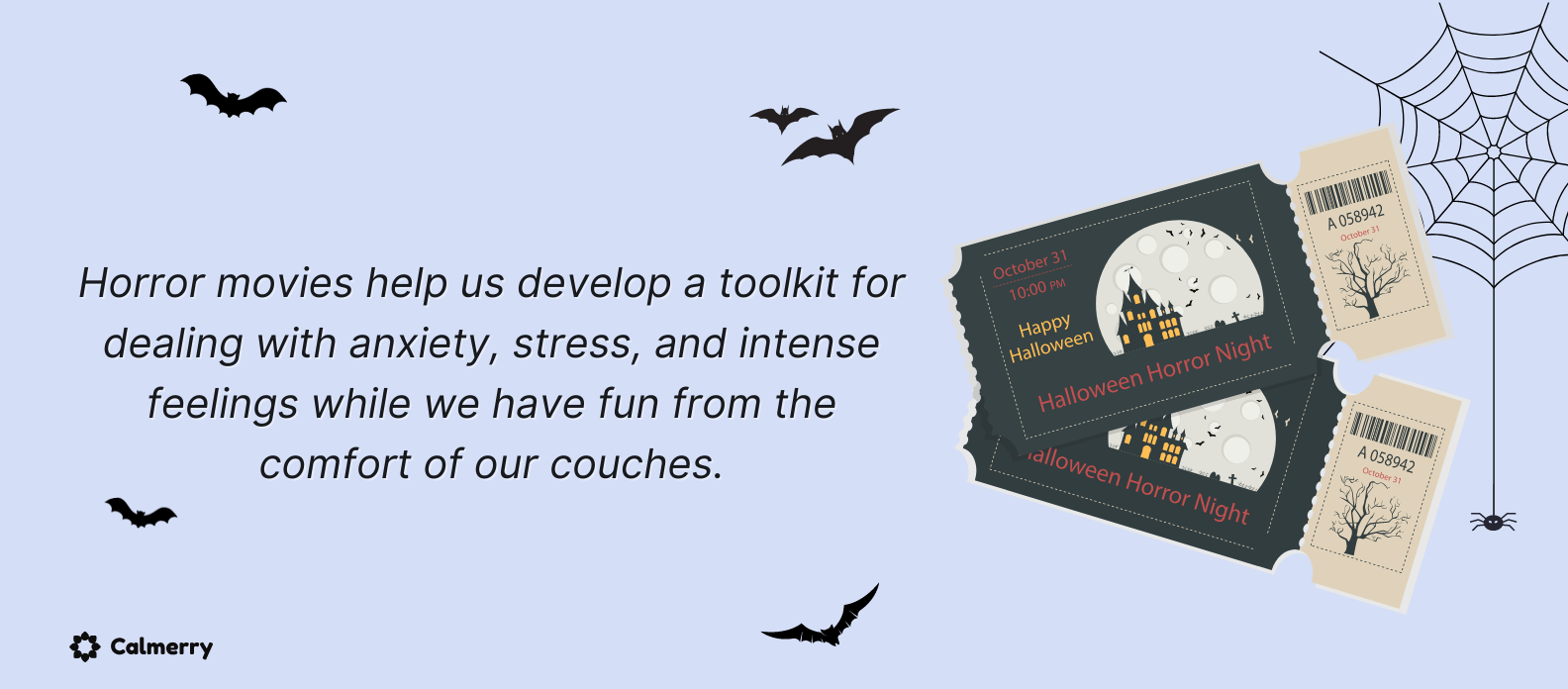
3. Horror movies improve our self-confidence and help us feel less lonely
Watching scary movies with others can be rewarding. Talking about our experiences and feelings with others while or after watching can also help us feel better.
- Horrors provide a socially acceptable environment for sharing our fears: “OMG, this is so scary, so scary… If I were there, I would die from the very thought of jumping from such a height.”
- In this safe space, we also learn to tolerate some of the uncomfortable physical symptoms we may experience: “My palms just got sweaty, and my heart’s about to pop out of my chest! Did you see his face?!”
- In addition, discussing fictional but disturbing situations increases our self-validation and improves self-confidence: “I can’t stand slashers, either. They’re disgusting. Let’s put on something less violent.”
In other words, we start seeing that being frightened, disgusted, nervous, worried, concerned, or stressed and venting about our feelings is OK. We normalize our emotions and reactions and feel less lonely in our fears.
4. Horror movies offer a sense of control and a good distraction
Unfortunately, these are challenging times for many people worldwide. The pandemic and global recession have led to a sharp increase in depression and anxiety levels.
Yet, 2020 was a boom year for scary movies. It may sound like a paradox, but a sense of control over the situations and emotions that horror movies offer can explain the correlation. [6] Clasen, M., Kjeldgaard‐Christiansen, J., & Johnson, J. A. (2020). Horror, personality, and threat simulation: A survey on the psychology of scary media. Evolutionary Behavioral Sciences, 14(3), 213–230. https://doi.org/10.1037/ebs0000152
Screen captures give us a surrogate experience where the threat is simple, distant, and controllable. “Don’t get bit, aim for the head” — the solution in The Walking Dead is straightforward. Or, even easier, you can always just cover your eyes.
In this case, it’s not bad to redirect the focus from real-life stressors to fictional ones. It can help us better understand our emotions in a safe environment and even improve problem-solving skills.
Besides, increasing perceived control soothes anxiety. [7] Salomons, T. V., Nusslock, R., Detloff, A. M., Johnstone, T., & Davidson, R. J. (2015). Neural Emotion Regulation Circuitry Underlying Anxiolytic Effects of Perceived Control over Pain. Journal of Cognitive Neuroscience, 27(2), 222–233. https://doi.org/10.1162/jocn_a_00702
Still, it doesn’t mean that we get a complete escape from real-life problems by switching focus to imaginary monsters. These are calming but short-term psychological effects of horror movies.
They do help stop the hamster wheel of rumination and spinning disturbing thoughts for a while. But it’s also important to process them healthily. Even better — with the help of a therapist.
5. Horror movies provide relief
Most people associate scary movies with fear and other “negative” emotions. But have you ever had a pleasurable feeling after a good horror flick that made you look for more?
Despite their goal to shock and scare, horrors can cause “enjoyable fear” and be the source of eustress — good stress. It’s a natural process:
- Distress stimulates the “fight-or-flight” response and an adrenaline rush. When you watch a scary movie, your body is pushed to its maximum stress level to keep you on the edge of your seat. Whether you feel emotional tension seeing it in the theatre with friends or by yourself at home, your heart rate increases, your palms feel sweaty, and you begin breathing more rapidly and deeply — but that’s where the line is drawn.
- But once a stressor is eliminated, our brain drives the “rest-and-digest” response. It releases powerful hormones — serotonin, dopamine, and oxytocin. They reduce stress levels and promote a subsequent sense of relief.
So, fear and excitement go hand-in-hand when you watch horror movies. And that’s why they feel like a roller coaster. It’s no surprise that some people watch them for enjoyment.
6. Horror movies enhance brain activity and cognitive functions
Horror movies stimulate multiple brain regions, engaging the amygdala responsible for fear processing and the frontal lobes crucial for reasoning and planning.
A study by the University of Turku revealed that while watching horror films, the brain’s visual and auditory processing regions become more active as anxiety builds.
Following a shocking scene, areas tied to emotional processing, threat evaluation, and decision-making show increased activity.
This continuous engagement enhances excitement and hones our problem-solving skills, especially under stress.
Moreover, the dopamine release triggered by the fear or adrenaline rush can increase alertness. [8] Horror movies manipulate brain activity expertly to enhance excitement. (2020, January 20). ScienceDaily. https://www.sciencedaily.com/releases/2020/01/200124104518.htm This may provide a pleasurable experience despite the horror and potentially aid in mood improvement and overall cognitive function.
So, through suspenseful scenes that demand predictive thinking and quick decision-making, horror movies offer a unique platform for cognitive engagement and brain activity enhancement. Although in a very unconventional way.
7. Horror movies may aid in personal growth and self-discovery
Personal growth often arises from challenging situations and introspection. Horror movies, by presenting extreme and often existential situations, challenge viewers to confront and reflect on their own values, beliefs, and mortality.
They offer a platform to delve deep into philosophical and moral questions:
- What does it mean to be human?
- How far would one go to survive?
- What are our moral boundaries when faced with life-and-death choices?
For instance, zombie movies often aren’t just about the undead chasing the living. They’re about humanity, society, and the essence of what keeps us civilized. Ghost stories might explore themes of regret, unfinished business, or the concept of an afterlife.
By engaging with these themes, viewers can undergo a process of self-discovery. They can better understand their own fears, moral compass, and reactions to high-stress situations, fostering a deeper understanding of oneself and promoting personal growth.
Moreover, after watching, we might have in-depth discussions or seek further reading on the philosophical and moral issues presented. This adds another layer to our personal development.
Why do people get scared of horror movies?
We all have fears. They’re inherent in our lives and serve as a healthy protective mechanism against threats. They can be in-born or learned and manifest in different ways. And sometimes, it takes a movie to bring out our fears, which is an essential element of horrors.
Сreators use many tricks to manipulate us, inviting us to explore our subconscious. [9] Nummenmaa, L. (2021, March 4). Psychology and neurobiology of horror movies. https://doi.org/10.31234/osf.io/b8tgs This is what makes a good horror movie so scary:
- The depiction of objects or situations of specific phobias (e.g., spiders, snakes, blood, height, closed spaces, darkness)
- Hazards in a real-life environment (death, illness, torturing, war, injuries)
- Looming uncertainty or a feeling of the unknown
- Supernatural objects and beliefs
- Thrill-inducing sound effects
- Human-like characters (monsters, corpses, robots, zombies, vampires)
- A sense of suspense or, vice versa, sudden shocks (canonical “jump scares,” sharp noises, rapid movements)
9 quick tips on how to not be scared of horror movies
If you plan to watch a scary movie on Halloween night or still can’t overcome the fright of being frightened, there are healthy ways to cope and enjoy a horror movie without being too scared.
- Find out what subgenre suits you — by the way, psychological horrors are the most preferred type, according to several surveys
- If it’s too overwhelming, take a break. Choose simple coping strategies and relaxation techniques that work for you
- Watch with the lights on or during the daytime
- Invite your friends or a loved one to join you
- Ease suspense by pausing and looking up spoilers
- Step forth and back scary scenes
- Remember: it isn’t real. The actors on the screen don’t actually want to hurt you. It’s just part of the story!
- Avoid binge-watching. Moderation is key
- If you want to avoid horror movies — it’s okay. Set boundaries for yourself — no one can force you to watch something you find upsetting. Take care of your own emotional comfort first
Are horror movies bad for you?
So, you actually can get some mental health benefits by watching scary movies. However, horrors are not for everyone. While some people don’t tolerate the violence of slashers, some avoid horrors altogether as a possible emotional trigger.
Although horror movies may positively impact mental health, it’s vital to be cautious while using them as a “coping” tool.
In some cases, they may cause more harm than good:
- Horror movies can negatively affect sensitive people and people with mental health problems, increasing stress, anxiety, panic, and depression
- Horrific images can trigger uncontrollable thoughts and flashbacks
- There may be potentially traumatic or overly distressing scenes that can cause debilitating sensations and symptoms
- Exposing yourself to your fears and practicing desensitization to the point of emotional numbness is counterproductive. It’s better to expose yourself to fears under the guidance of a trained mental health professional
- Scary flicks can trigger nightmares, and stress hormones can make it harder to sleep
- It’s important to talk to your doctor or a licensed therapist if you feel that your mental well-being worsens or symptoms become hard to control.
Trick or treat?
Horror movies bring about the Halloween spirit and create safe settings in which our subconscious unfolds. They help us explore our relationship with fears and healthily experience intense emotions.
Moreover, talking to a Calmerry therapist about these experiences, thoughts, and behaviors is even more beneficial.
You can start recording and tracking them in our free reflection bot Coa and then discuss them with a professional.
A therapist can help you explore how these experiences, thoughts, and behaviors relate to your life, discover the root cause of your worries and fears, practice better coping strategies, and provide you with the emotional support you need!
Fill this time with joy, celebration, and care for your mental health. Happy Halloween!
Hudson, M., Seppälä, K., Putkinen, V., Sun, L., Glerean, E., Karjalainen, T., Karlsson, H. K., Hirvonen, J., & Nummenmaa, L. (2020). Dissociable neural systems for unconditioned acute and sustained fear. NeuroImage, 216, 116522. https://doi.org/10.1016/j.neuroimage.2020.116522
Scrivner, C., Andersen, M. M., Schjoedt, U., & Clasen, M. (2023). The psychological benefits of scary play in three types of horror fans. Journal of Media Psychology, 35(2), 87–98. https://doi.org/10.1027/1864-1105/a000354
Scrivner, C., & Clasen, M. (2022). Why frightening imaginary worlds? Morbid curiosity and the learning potential of horror. Behavioral and Brain Sciences, 45. https://doi.org/10.1017/s0140525x21002259
Scrivner, Coltan & Christensen, Kara. (2021). Scaring away anxiety: Therapeutic avenues for horror fiction to enhance treatment for anxiety symptoms. 10.31234/osf.io/7uh6f.
Scrivner, C., Johnson, J. A., Kjeldgaard-Christiansen, J., & Clasen, M. (2021). Pandemic practice: Horror fans and morbidly curious individuals are more psychologically resilient during the COVID-19 pandemic. Personality and Individual Differences, 168, 110397. https://doi.org/10.1016/j.paid.2020.110397
Clasen, M., Kjeldgaard‐Christiansen, J., & Johnson, J. A. (2020). Horror, personality, and threat simulation: A survey on the psychology of scary media. Evolutionary Behavioral Sciences, 14(3), 213–230. https://doi.org/10.1037/ebs0000152
Salomons, T. V., Nusslock, R., Detloff, A. M., Johnstone, T., & Davidson, R. J. (2015). Neural Emotion Regulation Circuitry Underlying Anxiolytic Effects of Perceived Control over Pain. Journal of Cognitive Neuroscience, 27(2), 222–233. https://doi.org/10.1162/jocn_a_00702
Horror movies manipulate brain activity expertly to enhance excitement. (2020, January 20). ScienceDaily. https://www.sciencedaily.com/releases/2020/01/200124104518.htm
Nummenmaa, L. (2021, March 4). Psychology and neurobiology of horror movies. https://doi.org/10.31234/osf.io/b8tgs
online therapy
live video session
